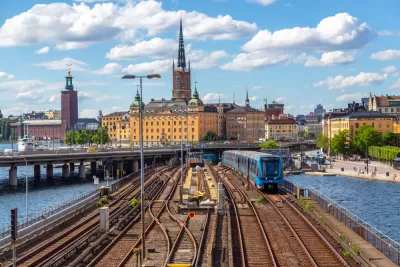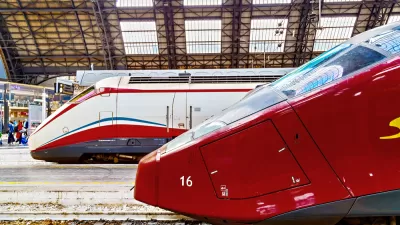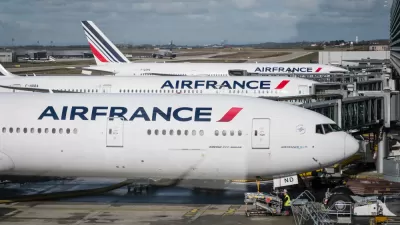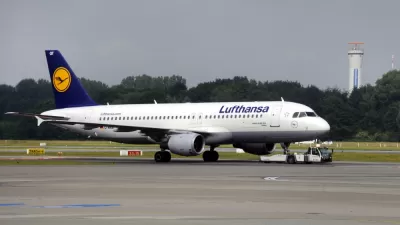A greener life means fewer flights for many Europeans.

Lisa Abend reports on the growing popularity of train travel over air travel among an increasingly eco-conscious European population:
This is the season of flygskam, or “flight shame.” You don’t have to be Greta Thunberg, the teenage climate activist who recently announced plans to sail to New York in August, to recognize that a growing number of Europeans eager to reduce their carbon footprint are opting to limit air travel in favor of more environmentally-friendly means of transportation.
The counterpart of flygskam is tagskryt, or train-bragging, notes Abend. European counties and private rail companies are responding the new cultural milieu by considering the return of long distance night-time trains.
The cultural trend is aided by two grassroots initiatives: "Flygfritt, which convinced 14,500 Swedes to renounce air travel in 2019 (it’s shooting for 100,000 in 2020) and Tagsemester, a Facebook group with nearly 100,000 members, that offers information on how to travel by train."
In case the Swedish origin of the word might imply that the trend is confined to the Scandinavian states, Abend also expands the purview of the discussion:
Yet Sweden isn’t the only place feeling the effects of flygskam (in fact, the Dutch, Germans, and Finns have their own words for it). Flygfritt now has chapters in the UK, France, and Germany and according to Eurail and Interrail General Manager Carlo Boselli, flygskam is influencing the decision to purchase the rail passes (which allow for cross-border travel anywhere on the continent) as well.
The movement has enough traction in Germany, for instance, that the Alliance 90/The Greens political party recently announced a plan to replace domestic air travel with train travel by 2035.
FULL STORY: In Europe, the Movement to Give Up Air Travel Is Taking Off. Could the U.S. Be Next?

Study: Maui’s Plan to Convert Vacation Rentals to Long-Term Housing Could Cause Nearly $1 Billion Economic Loss
The plan would reduce visitor accommodation by 25,% resulting in 1,900 jobs lost.

North Texas Transit Leaders Tout Benefits of TOD for Growing Region
At a summit focused on transit-oriented development, policymakers discussed how North Texas’ expanded light rail system can serve as a tool for economic growth.

Using Old Oil and Gas Wells for Green Energy Storage
Penn State researchers have found that repurposing abandoned oil and gas wells for geothermal-assisted compressed-air energy storage can boost efficiency, reduce environmental risks, and support clean energy and job transitions.

Santa Barbara Could Build Housing on County Land
County supervisors moved forward a proposal to build workforce housing on two county-owned parcels.

San Mateo Formally Opposes Freeway Project
The city council will send a letter to Caltrans urging the agency to reconsider a plan to expand the 101 through the city of San Mateo.

A Bronx Community Fights to Have its Voice Heard
After organizing and giving input for decades, the community around the Kingsbridge Armory might actually see it redeveloped — and they want to continue to have a say in how it goes.
Urban Design for Planners 1: Software Tools
This six-course series explores essential urban design concepts using open source software and equips planners with the tools they need to participate fully in the urban design process.
Planning for Universal Design
Learn the tools for implementing Universal Design in planning regulations.
Ascent Environmental
Borough of Carlisle
Institute for Housing and Urban Development Studies (IHS)
City of Grandview
Harvard GSD Executive Education
Toledo-Lucas County Plan Commissions
Salt Lake City
NYU Wagner Graduate School of Public Service





























